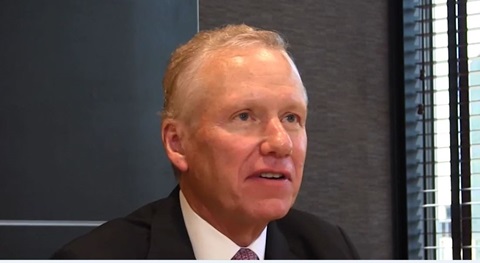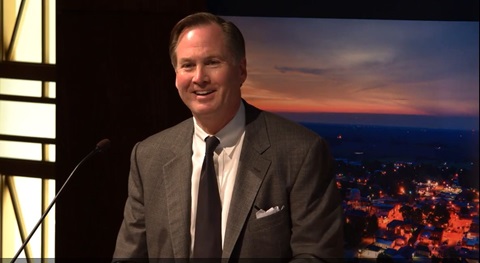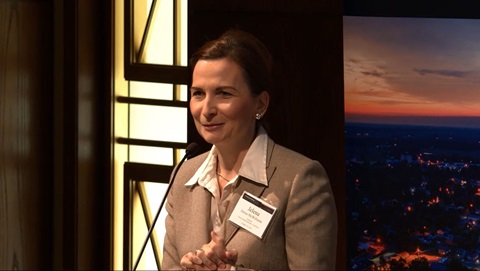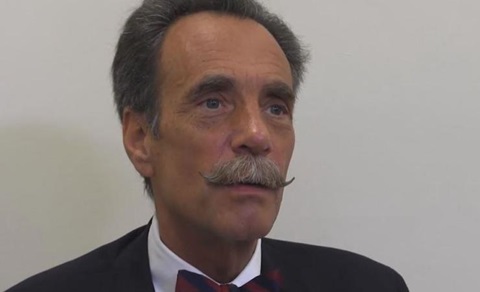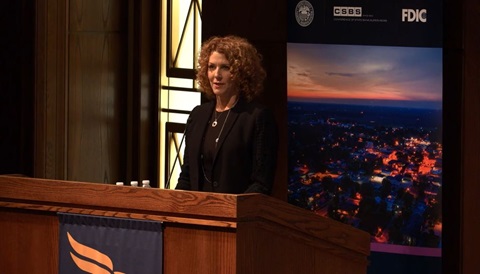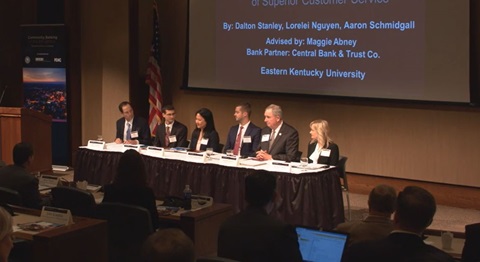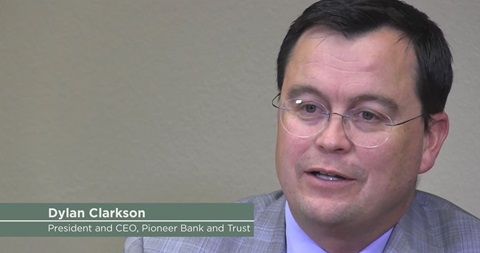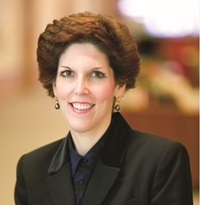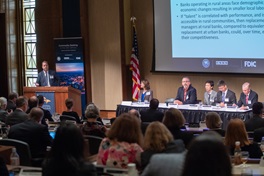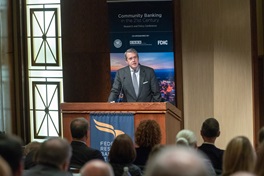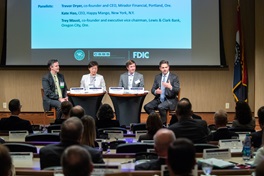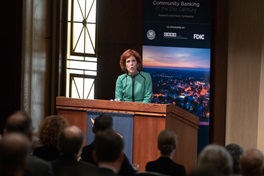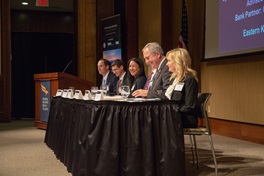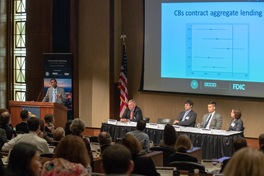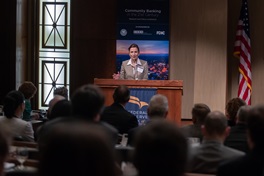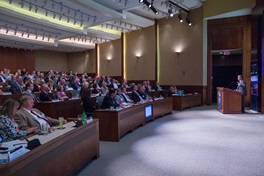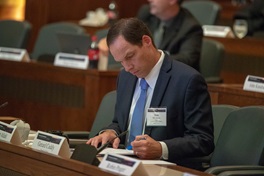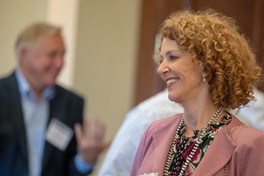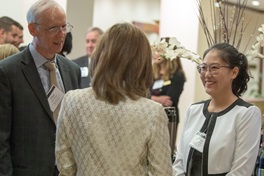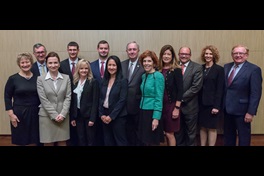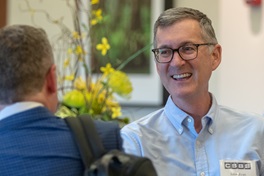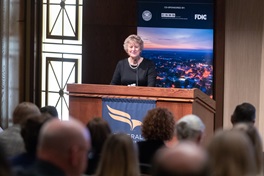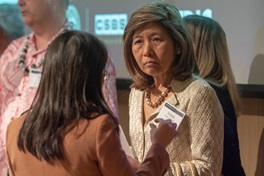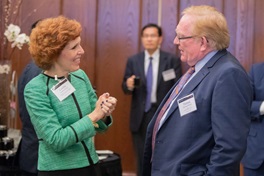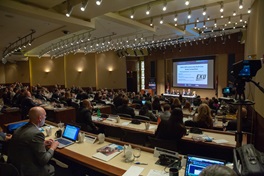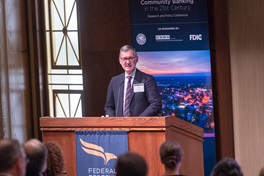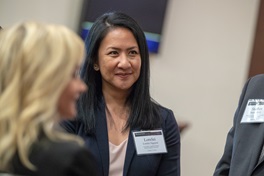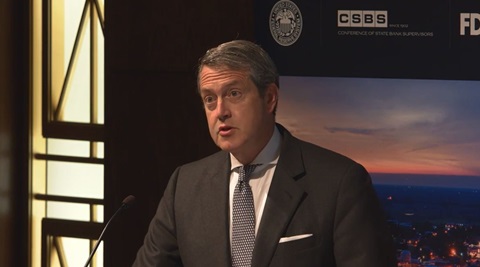
Community Banking in the 21st Century
The sixth annual Community Banking in the 21st Century research and policy conference—sponsored by the Federal Reserve System, the Conference of State Bank Supervisors (CSBS) and the Federal Deposit Insurance Corp. (FDIC)—will take place Oct. 3-4 at the Federal Reserve Bank of St. Louis. The conference brings together community bankers, academics, policymakers and bank regulators to discuss the latest research on community banking.
The conference presents an innovative approach to the study of community banks. Academics explore issues raised by the industry in a neutral, empirical manner and present their findings at the conference. Community bankers contribute to an annual national survey prior to the conference and then participate directly in the conference by serving as keynote speakers and panelists and by providing feedback to the research presented.
This year’s keynote speakers are Federal Reserve Bank of Cleveland President Loretta J. Mester, Federal Reserve Vice Chairman for Supervision Randal K. Quarles, and Beneficial Bank’s President and CEO Gerard Cuddy. Other guest speakers include CSBS Chairman and Mississippi Department of Banking and Consumer Finance Commissioner Charlotte Corley; FDIC Chairman Jelena McWilliams; Federal Reserve Bank of St. Louis President James Bullard; and CSBS President and CEO John Ryan.
For more information, please contact conference@communitybanking.org.
Conference Agenda
Gateway Auditorium, 6th Floor | Federal Reserve Bank of St. Louis
October 3-4, 2018
Download as PDF
- Wednesday, October 3
-
Welcome
 Charlotte Corley
Charlotte Corley
Commissioner, Mississippi Department of Banking and Consumer Finance; chairman, Conference of State Bank Supervisors - CSBS
-
Opening Keynote Address
-
Research Paper Session 1
Small Business Lending Moderator: Gregory Udell
Moderator: Gregory Udell
Chase Chair of Banking and Finance at the Kelley School of Business, Indiana University
 Community Bank Discussant: Janet Garufis
Community Bank Discussant: Janet Garufis
President and CEO, Montecito Bank and Trust, Santa Barbara, California
Did Bank Small-Business Lending in the U.S. Recover After the Financial Crisis?Rebel Cole, Florida Atlantic UniversityHow Important are Local Community Banks to Small Business Lending? Evidence from Mergers and AcquisitionsJulapa Jagtiani, Federal Reserve Bank of PhiladelphiaRemote Competition and Small Business Loans: Evidence from SBA LendingWenhua Di, Federal Reserve Bank of DallasSimilarities and Differences in Small Business Lending Between Small and Large Banks: Findings from the Small Business Lending SurveyYan Lee, Federal Deposit Insurance Corporation (FDIC)Small Business Lending: Moderated Q&A -
Break
-
Presentation of Case Study
 Introduction: Bret Afdahl
Introduction: Bret Afdahl
Chairman,Conference of State Bank Supervisors (CSBS); Director of Banking, South Dakota Division of Banking
Case Study TeamLorelei Nguyen, Aaron Schmidgall and Dalton Stanley, Eastern Kentucky University
Faculty AdvisorMaggie Abney, Executive in Residence for Banking, Eastern Kentucky University
Community Bank PartnerStephen Kelly, Executive Vice President, Central Bank & Trust Co., Lexington, Ky.
CSBS Community Banking Case Study Competition Moderated Q&A -
Day One Closing Remarks
-
Dinner Reception
-
Evening Keynote
- Thursday, October 4
-
Breakfast and Networking
-
Morning Keynote Address
-
Research Paper Session 2
Competition in Banking Community Bank Discussant: Gilda Nogueira
Community Bank Discussant: Gilda Nogueira
President and Chief Executive Officer, East Cambridge Savings Bank, Cambridge, Mass.
The Effects of Competition in Consumer Credit MarketsStefan Gissler, Board of Governors of the Federal Reserve SystemThe Competitive Effects of Megabanks on Community BanksTroy Kravitz, federal-deposit-insurance-corporation---fdicDepositors Disciplining Banks: The Impact of ScandalsMikael Homanen, Cass Business School, City, University of LondonCompetition in Banking: Moderated Q&A -
Break
-
Research Paper Session 3
Bank Management and Performance Moderator: Elizabeth K. Kiser
Moderator: Elizabeth K. Kiser
Associate Director and Economist, Board of Governors of the Federal Reserve System
CEO Succession and Performance at Rural BanksMike Milchanowski, Federal Reserve Bank of St LouisStress Testing Community BanksRobert DeYoung, University of KansasTechnology Investment, Firm Performance and Market Value: Evidence from BanksZifeng Feng, Florida International UniversityBank Management and Performance: Moderated Q&A -
Lunch
-
2018 National Survey Results
 Presenter: Michael Stevens
Presenter: Michael Stevens
Senior Executive Vice President, Conference of State Bank Supervisors - CSBS
-
Panel Discussion: The Future of Community Banking
Panelists -
Conference Adjourns
Research Papers, Authors and Key Findings
Research Paper Session 1
Small Business Lending
Did Bank Small-Business Lending in the U.S. Recover After the Financial Crisis?
Author: Rebel Cole, Florida Atlantic University
Key Findings: The author finds that, despite a recovery of overall business lending by U.S. banks after the financial crisis, small business lending remained depressed, particularly among large banks and banks in worse financial condition.
How Important are Local Community Banks to Small Business Lending? Evidence from Mergers and Acquisitions
Authors: Julapa Jagtiani, Federal Reserve Bank of Philadelphia; Raman Maingi, Federal Reserve Bank of Philadelphia
Key Findings: This paper finds that acquisitions of community banks by non-local acquiring banks (without a local presence) lead to declines in local small business lending. The authors describe this finding as consistent with a redirection of funding for small business loans to localities served by the acquirer. They conclude that the diminishing presence of local community banks has led to credit gaps that are not being filled by the rest of the banking sector.
Remote Competition and Small Business Loans: Evidence from SBA Lending
Authors: Wenhua Di, Federal Reserve Bank of Dallas; Nathaniel Pattison, Southern Methodist University
Key Findings: This paper examines the impact of remote lenders on the supply of small business loans guaranteed by the Small Business Administration. Results suggest that the entry of a large remote lender into specific industries generates significant growth in lending with little evidence of a reduction in loans by incumbent SBA lenders. Further analysis indicates that remote lenders have greater market share in counties where SBA loans from traditional banks were less common.
Similarities and Differences in Small Business Lending Between Small and Large Banks: Findings from the Small Business Lending Survey
Authors: Yan Lee, Federal Deposit Insurance Corporation (FDIC); Jacob Goldston, federal-deposit-insurance-corporation---fdic; Smith Williams, Federal Deposit Insurance Corporation (FDIC)
Key Findings: The authors analyze the small business lending practices of banks using a nationally-representative survey conducted by the Federal Deposit Insurance Corporation. They document that both small and large banks have distinct advantages in lending to small businesses, with small banks more likely to emphasize relationship lending technologies and large banks more likely to use transactional ones. However, they also find that small business lending for all-sized banks is in general characterized by practices that are locally-based, relationship-oriented, and high-touch (meaning, staff-intensive).
Small Business Lending: Moderated Q&A
Research Paper Session 2
Competition in Banking
The Effects of Competition in Consumer Credit Markets
Author: Stefan Gissler, Board of Governors of the Federal Reserve System
Key Findings:
This paper provides evidence that greater competition from credit unions induce banks to become more efficient, with consumers benefitting from higher deposit rates and lower borrowing costs. However, shadow banks change their credit policy and aggressively expand credit to riskier borrowers, resulting in higher default rates. The authors conclude that increased competition can lead to large changes in credit policy at institutions outside the traditional supervisory umbrella, possibly creating a less stable financial system.
The Competitive Effects of Megabanks on Community Banks
Author: Troy Kravitz, federal-deposit-insurance-corporation---fdic
Key Findings: This paper examines the effects of big bank merger activity of small bank health. The authors show that big banks are expanding primarily within urban areas. While small banks are doing relatively worse in these areas, big bank expansion is actually helping small banks by removing a competitor from their market.
Depositors Disciplining Banks: The Impact of Scandals
Author: Mikael Homanen, Cass Business School, City, University of London
Key Findings:
The author observes decreases in deposit growth at nine “major” banks that financed the controversial Dakota Access Pipeline, particularly among branches located closest to the pipeline and branches in environmentally or socially conscious counties. He also finds that local savings banks were “beneficiaries of this unanticipated depositor movement."
Competition in Banking: Moderated Q&A
Research Paper Session 3
Bank Management and Performance
CEO Succession and Performance at Rural Banks
Authors: Mike Milchanowski, Federal Reserve Bank of St Louis; Drew Dahl, Federal Reserve Bank of St Louis
Key Findings:
This paper finds that CEO replacement at rural banks, relative to urban banks, does not require compromises that are evident in subsequent declines in performance as assessed by regulators. These results are inconsistent with the notion that rural banks are threatened by “talent migration” and therefore are unable to replace CEOs with the same effectiveness as urban banks.
Stress Testing Community Banks
Authors: Robert DeYoung, University of Kansas; Joseph Fairchild, University of Kansas)
Key Findings: The authors present a “top-down” stress testing model specifically developed for community banks. The model, which relies solely on publicly available data, offers community banks the opportunity to analyze risks from a perspective that otherwise could be prohibitively expensive for them to consider.
Home Biased Credit Allocations
Author: Ivan Lim, Leeds University
Key Findings: This paper provides evidence of a “favoritism bias” by which banks make more loans, and open more branches, in areas near the birthplaces of their CEOs. Favoritism is stronger among altruistic CEOs, in struggling areas and among marginal mortgage applicants.
Technology Investment, Firm Performance and Market Value: Evidence from Banks
Authors: Zifeng Feng, Florida International University; Zhonghua Wu, Florida International University
Key Findings: This paper studies increasing investment in technology by banks in recent years. The authors provide evidence of a positive relationship between technological spending and performance that is driven primarily by large banks and reflects improvement in operational efficiency rather than sales increases.
Bank Management and Performance: Moderated Q&A
Speakers and Panelists
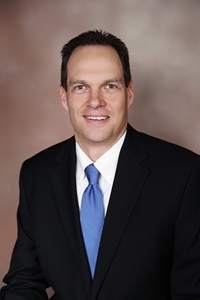
Bret Afdahl was appointed director of the South Dakota Division of Banking in May 2011 after serving as counsel to the division since October 2006. Afdahl is the current chair of the Conference of State Bank Supervisors (CSBS), the nation’s leading advocate for the state banking system and the only national organization dedicated to advancing the state banking system. Prior to joining the division, Afdahl worked on the legal staff at the South Dakota Department of Revenue and Regulation on a variety of tax and compliance issues. He is a graduate of Northern State University with a degree in political science and business, a graduate of the University of South Dakota School of Law, and holds a certification as a fiduciary and investment risk specialist (CFIRS) from the Cannon Financial Institute.

James Bullard is the president and CEO of the Federal Reserve Bank of St. Louis. In that role, he is a participant on the Federal Reserve’s Federal Open Market Committee (FOMC), which meets regularly to set the direction of U.S. monetary policy. He also oversees the Federal Reserve’s Eighth District, including activities at the St. Louis headquarters and its branches in Little Rock, Arkansas, Louisville, Kentucky, and Memphis, Tennessee. A noted economist and policymaker, Bullard makes Fed transparency and dialogue a priority on the international and national stage as well as on Main Street. He serves on the board of directors of the St. Louis Regional Chamber and the board of directors of Concordance Academy of Leadership, and he is a past board chair of the United Way U.S.A. Bullard is co-editor of the Journal of Economic Dynamics and Control, and a member of the Central Bank Research Association’s senior council. He is an honorary professor of economics at Washington University in St. Louis, where he also sits on the advisory council of the economics department and the advisory board of the Center for Dynamic Economics. A native of Forest Lake, Minnesota, Bullard received his doctorate in economics from Indiana University in Bloomington.
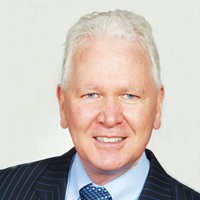
Rebel A. Cole serves as the Kaye Family Endowed Chair of Finance at the College of Business at Florida Atlantic University, Boca Raton, Fla., where he has taught since 2016. Previously, he was a professor of finance at DePaul University in Chicago, the University of New South Wales in Sydney, Australia, and the University of Auckland in New Zealand. He has also served as an economist for the Federal Home Loan Bank Board, the Federal Reserve Bank of Dallas and the Board of Governors of the Federal Reserve System in Washington, D.C. His primary areas of research are commercial banking, corporate governance, financial institutions, real estate and small-business finance. He has published peer-reviewed articles in academic journals that include the Journal of Finance, the Journal of Financial Economics, the Journal of Financial and Quantitative Analysis, the Journal of Financial Intermediation, the Journal of Corporate Finance Journal of Banking and Finance, the Journal of Real Estate Finance and Economics, and Real Estate Economics. He received his Doctorate in finance from the Kenan-Flagler School of Business at the University of North Carolina.
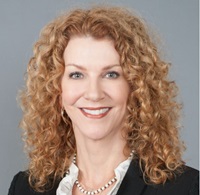 Charlotte Corley is the commissioner of the Mississippi Department of Banking and Consumer Finance (DBCF). She was appointed in November 2014. After joining the DBCF in 1985 as a bank examiner, Corley worked her way through the ranks to become banking division director in 2000 and deputy commissioner in 2013. A native Mississippian, Corley earned her Bachelor of Business Administration in banking and finance from Mississippi State University. She is a graduate of the School of Banking of the South at Louisiana State University, as well as the American Bankers Association’s National Graduate Trust School at Northwestern University. She is chairman of the Conference of State Bank Supervisors (CSBS), the nation’s leading advocate for the state banking system and the only national organization dedicated to advancing the state banking system. She was a longstanding member of the Interagency Supervisory Processes Committee, helping coordinate the processes of federal and state banking regulatory agencies. She is a past member of CSBS’s state supervisory processes and technology committees and is the former chair of its education foundation. Corley has also served as a member of the Federal Financial Institutions Examination Council’s Task Force on examiner education.
Charlotte Corley is the commissioner of the Mississippi Department of Banking and Consumer Finance (DBCF). She was appointed in November 2014. After joining the DBCF in 1985 as a bank examiner, Corley worked her way through the ranks to become banking division director in 2000 and deputy commissioner in 2013. A native Mississippian, Corley earned her Bachelor of Business Administration in banking and finance from Mississippi State University. She is a graduate of the School of Banking of the South at Louisiana State University, as well as the American Bankers Association’s National Graduate Trust School at Northwestern University. She is chairman of the Conference of State Bank Supervisors (CSBS), the nation’s leading advocate for the state banking system and the only national organization dedicated to advancing the state banking system. She was a longstanding member of the Interagency Supervisory Processes Committee, helping coordinate the processes of federal and state banking regulatory agencies. She is a past member of CSBS’s state supervisory processes and technology committees and is the former chair of its education foundation. Corley has also served as a member of the Federal Financial Institutions Examination Council’s Task Force on examiner education.
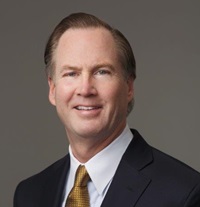 Gerard Cuddy joined Beneficial Bank in 2006 and was named President and CEO in January 2007. Gerard and his team led Beneficial in its two step stock offering, converting from a mutual holding company to a fully public bank. He and his team have also completed four major acquisitions (Farmer’s & Mechanics Bank, CLA Insurance Company, SEF Financial, and Conestoga Bancorp) and recently founded equipment leasing company Neumann Finance. Under his leadership, Beneficial has focused on its mission as an education company, providing the bank’s customers with the tools and knowledge to help them do the right thing financially.
Gerard Cuddy joined Beneficial Bank in 2006 and was named President and CEO in January 2007. Gerard and his team led Beneficial in its two step stock offering, converting from a mutual holding company to a fully public bank. He and his team have also completed four major acquisitions (Farmer’s & Mechanics Bank, CLA Insurance Company, SEF Financial, and Conestoga Bancorp) and recently founded equipment leasing company Neumann Finance. Under his leadership, Beneficial has focused on its mission as an education company, providing the bank’s customers with the tools and knowledge to help them do the right thing financially. Gerard is a 38-year veteran of the financial services industry, and has held a range of senior management roles over the course of his career. He has experience in investment, private, and commercial banking having served as the Senior Loan Officer for Commercial Lending at Commerce Bank and the Regional Managing Director for Fleet private banking in Pennsylvania. Additionally, he served in various senior management positions with First Union National Bank and Citigroup in the metro Philadelphia region. He has been profiled and quoted in American Banker, The New York Times, The Philadelphia Inquirer and The Huffington Post.
Committed to improving the communities that the Beneficial serves, Gerard is a board member of the Foreign Policy Research Institute and the Pennsylvania Academy of Fine Arts and a past Board member of the Franklin Institute, the Archdiocese of Philadelphia, the Philadelphia Orchestra, the Union League of Philadelphia and the Federal Reserve Bank of Philadelphia Depository Council. He is the recipient of many awards including the La Salle University’s Leadership Award, the Rutgers University Leadership Award, the Distinguished Catholic Graduate Award, the American Catholic Historical Society’s Barry Award and the Jewish Relief Agency Annual Award.
Gerard holds his Bachelor of Arts degree in Economics from Villanova University and earned his Masters of Business Administration from St. Joseph’s University in Philadelphia. He and his family reside in Rosemont, Pennsylvania.
About Beneficial Bank
Founded in 1853, Beneficial Bank is the oldest and largest bank headquartered in Philadelphia. It is a community-based, full-service financial services company that has served individuals and businesses in the Delaware Valley for 165 years. With 60+ offices in the greater Philadelphia and South Jersey regions and $5.8 billion in assets, Beneficial offers a full array of financial products that includes commercial, consumer, SBA, leasing, real estate lending and insurance. Visit www.thebeneficial.com for more information.
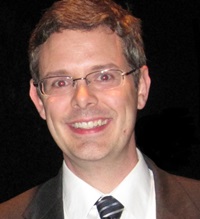 Paul Davis is the editor of the Community Banking bureau at American Banker. He was formerly the senior reporter in the publication’s National bureau. Prior to American Banker, he was the news editor at SNL Financial and a senior banking reporter for American City Business Journals, where he was honored twice by the North Carolina Press Association. He was also the director of social media for the Wake Forest University Schools of Business. He has provided commentary on banking and other large corporations for BBC World News and Nightly Business Report. He has a bachelor’s degree from the University of Virginia in government and an MBA from Wake Forest University.
Paul Davis is the editor of the Community Banking bureau at American Banker. He was formerly the senior reporter in the publication’s National bureau. Prior to American Banker, he was the news editor at SNL Financial and a senior banking reporter for American City Business Journals, where he was honored twice by the North Carolina Press Association. He was also the director of social media for the Wake Forest University Schools of Business. He has provided commentary on banking and other large corporations for BBC World News and Nightly Business Report. He has a bachelor’s degree from the University of Virginia in government and an MBA from Wake Forest University.
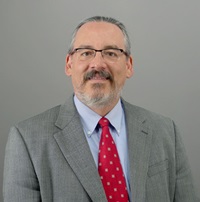 Robert (Bob) DeYoung is the Capitol Federal Distinguished Professor in Financial Markets and Institutions, and Harold Otto Professor of Economics, at the University of Kansas (KU) School of Business. He is also co-editor of the Journal of Money, Credit and Banking. Prior to his academic career, DeYoung spent 15 years in the research groups of the Office of the Comptroller of the Currency, the Federal Reserve Bank of Chicago, and the Federal Deposit Insurance Corporation. DeYoung has written extensively on the performance and regulation of financial institutions in leading academic journals, regulatory publications and the financial press. He earned a bachelor’s degree from Rutgers University-Camden in 1983 and a doctorate in economics from the University of Wisconsin-Madison in 1989.
Robert (Bob) DeYoung is the Capitol Federal Distinguished Professor in Financial Markets and Institutions, and Harold Otto Professor of Economics, at the University of Kansas (KU) School of Business. He is also co-editor of the Journal of Money, Credit and Banking. Prior to his academic career, DeYoung spent 15 years in the research groups of the Office of the Comptroller of the Currency, the Federal Reserve Bank of Chicago, and the Federal Deposit Insurance Corporation. DeYoung has written extensively on the performance and regulation of financial institutions in leading academic journals, regulatory publications and the financial press. He earned a bachelor’s degree from Rutgers University-Camden in 1983 and a doctorate in economics from the University of Wisconsin-Madison in 1989.
 Trevor Dryer is the co-founder and CEO of Portland, Ore.-based Mirador, providers of the leading small business digital lending platform. The Mirador platform powers a new type of relationship between small businesses and lenders, enabling banks, credit unions and other financial institutions to decision loans in 24 hours or less. Prior to Mirador, Trevor led mobile payments and small business point-of-sale product lines for Intuit and contributed to its online banking solution for mid-sized financial institutions. Dryer is a graduate of Harvard University and received his juris doctorate from Stanford Law School in Palo Alto, Calif.
Trevor Dryer is the co-founder and CEO of Portland, Ore.-based Mirador, providers of the leading small business digital lending platform. The Mirador platform powers a new type of relationship between small businesses and lenders, enabling banks, credit unions and other financial institutions to decision loans in 24 hours or less. Prior to Mirador, Trevor led mobile payments and small business point-of-sale product lines for Intuit and contributed to its online banking solution for mid-sized financial institutions. Dryer is a graduate of Harvard University and received his juris doctorate from Stanford Law School in Palo Alto, Calif.
 Zifeng Feng is a Ph.D. candidate in Finance at Florida International University. He holds an M.Sc. in Real Estate from Florida International University, an M.B.A. from Jinan University, and a B.A. in Public Administration from Peking University. Zifeng maintains an active research program on topics related to technology investment, operational efficiency, executive compensation, and the role of employees, mostly focused on the areas of corporate finance, banking, and real estate. He has published an article in Journal of Real Estate Finance and Economics. He has presented his papers in several academic and professional meetings, including American Real Estate Society Annual Meeting, American Real Estate and Urban Economics Association Annual Meeting. His teaching experience includes such courses as Financial Management, Intermediate Finance, Real Estate Principles, Real Estate Valuation, and Real Estate Investment. Before moving to the academic world, Zifeng worked for over ten years in consultancy and real estate. He has a global perspective and organizational skills to accomplish difficult challenges.
Zifeng Feng is a Ph.D. candidate in Finance at Florida International University. He holds an M.Sc. in Real Estate from Florida International University, an M.B.A. from Jinan University, and a B.A. in Public Administration from Peking University. Zifeng maintains an active research program on topics related to technology investment, operational efficiency, executive compensation, and the role of employees, mostly focused on the areas of corporate finance, banking, and real estate. He has published an article in Journal of Real Estate Finance and Economics. He has presented his papers in several academic and professional meetings, including American Real Estate Society Annual Meeting, American Real Estate and Urban Economics Association Annual Meeting. His teaching experience includes such courses as Financial Management, Intermediate Finance, Real Estate Principles, Real Estate Valuation, and Real Estate Investment. Before moving to the academic world, Zifeng worked for over ten years in consultancy and real estate. He has a global perspective and organizational skills to accomplish difficult challenges.
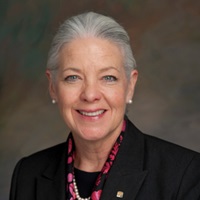 Janet Garufis began her distinguished banking career as a teller almost 50 years ago with Security Pacific Bank, now Bank of America. She rose through the ranks of retail banking and after completing the Security Pacific Management Training Program, successfully led retail banking, commercial banking and private banking organizations.
Janet Garufis began her distinguished banking career as a teller almost 50 years ago with Security Pacific Bank, now Bank of America. She rose through the ranks of retail banking and after completing the Security Pacific Management Training Program, successfully led retail banking, commercial banking and private banking organizations.She was born in Los Angeles and graduated from Marymount High School. She attended UCLA and holds B.A. and M.A. degrees from California State University Northridge. She moved to Santa Barbara in 2002 to attend the Gevirtz Graduate School of Education, UC Santa Barbara to earn a Ph.D. Her educational pursuits were put on hold when she joined Montecito Bank & Trust in 2004. In 2006 she became CEO & President and in 2017 accepted the role of Chairman of the Board and continues her role as CEO. In 2022 Fielding University awarded Janet the Honorary Degree of Doctor of Philosophy in Humane Letters for her leadership and contributions to Fielding and the community.
Janet actively contributes her time and talent to local non-profits as well as industry associations. She currently chairs the Santa Barbara Symphony Board of Directors, and serves on the Sansum Board of Trustees (past Chair), the Scholarship Foundation of Santa Barbara Board of Directors (past Chair) and the Board of the Santa Barbara South Coast Chamber of Commerce.
She has previously served in different capacities with Women’s Economic Ventures, CALM, United Way, Music Academy of the West, the Santa Barbara Library, California State University Channel Islands, Habitat for Humanity, Fielding University, American Heart Association, PublicSquare and many others.
She also serves on industry boards including the Pacific Business Management Institute of Pacific Coast Banking School and the Board of the American Bankers Association Foundation Board. She has previously served on the Community Depository Institutions Advisory Council of the Federal Reserve Bank’s 12th District (CDIAC) and served as the Chair of the council in 2017 and 2018 and as the National CDIAC Chair in 2018.
In her spare time, Janet enjoys running, gardening and cooking. She loves spending time with her two sons and their families…especially her grandchildren!
Awards and accolades include: Santa Barbara Woman of the Year (2017), American Banker – 25 Most Powerful Women to Watch (2015, 2017), Pacific Coast Business Times - Top 50 Women in Biz (2007 – 2021), California State University Northridge Distinguished Alumna of the Year 2018, Pacific Coast Business Times Inaugural Distinguished Achievement Award (2018), Association of Fundraising Professionals – Volunteer of the Year (2015), United Way Abercrombie Community Excellence Award (2015), American Heart Association - Lifestyle Change Award (2013), Girls Inc. (Carpinteria) - Women of Inspiration Award (2012), Santa Barbara Chamber Businesswoman of the Year (2010), and Pierre Claeyssens Award for Distinguished Service (2010).

Kate Hao is the CEO of New York City-based Happy Mango, which she founded in 2013 to bring greater transparency to credit reporting. Kate was previously the treasurer of the broker-dealer subsidiary of Morgan Stanley, where she worked for over 12 years across various functions. While working as a bond trader during the 2008 crisis, she recognized the limitations of existing consumer credit reporting systems, which provided information about a problem only after the problem had occurred. Her training in fundamental financial analysis enabled her to develop a forward-looking consumer credit assessment algorithm that lay the foundation of the Happy Mango Score computation. Her executive experience in managing large teams and complex projects ultimately led to her decision to bring her idea forward and form Happy Mango. She earned her MBA from Harvard Business School and her Bachelor of Arts in Accounting from Albion College. She is a Chartered Financial Analyst (CFA), Certified Public Accountant (CPA) and Financial Risk Manager (FRM).
 Mikael Homanen is a PhD Candidate in Finance at Cass Business School in London. His research focuses on the intersection of externalities and financial markets with a further focus on banking and investor ESG (Environmental, Social & Governance) policies. He recently visited the Wharton School and Singapore Management University. He is an advisor to an ESG fund and has also worked at the World Bank's Development Economics Research Group (DECRG). His recent research examines depositor activism induced by bank scandals, global corporate governance practices and he is involved in projects examining the effectiveness of investor engagement, which is funded by the UN Principles for Responsible Investment (UNPRI). He completed his MPHil in Finance as well as BSc at Tilburg University in the Netherlands.
Mikael Homanen is a PhD Candidate in Finance at Cass Business School in London. His research focuses on the intersection of externalities and financial markets with a further focus on banking and investor ESG (Environmental, Social & Governance) policies. He recently visited the Wharton School and Singapore Management University. He is an advisor to an ESG fund and has also worked at the World Bank's Development Economics Research Group (DECRG). His recent research examines depositor activism induced by bank scandals, global corporate governance practices and he is involved in projects examining the effectiveness of investor engagement, which is funded by the UN Principles for Responsible Investment (UNPRI). He completed his MPHil in Finance as well as BSc at Tilburg University in the Netherlands.
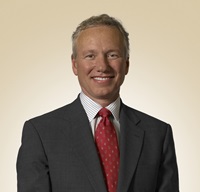 Tom Hough is Chairman and Chief Executive Officer of Carrollton Bank, a fifth generation company founded in 1877 in Carrollton, Illinois by his great-great grandfather. Tom is a native of Carrollton and graduated from the University of Illinois College of Business. He joined the bank in 1973 when it had $7 million in assets at its original location in Carrollton.
Tom Hough is Chairman and Chief Executive Officer of Carrollton Bank, a fifth generation company founded in 1877 in Carrollton, Illinois by his great-great grandfather. Tom is a native of Carrollton and graduated from the University of Illinois College of Business. He joined the bank in 1973 when it had $7 million in assets at its original location in Carrollton.Today, Carrollton Bank has ten locations, including eight in the St. Louis MSA and two in central Illinois, and assets of$1.6 billion. Virtually all of the bank's
growth has been organic in nature. Carrollton remains a privately-held, owner operated company, with the majority of its shareholders being full-time employees, who serve customers and build long-term relationships on a daily basis.
Tom is a board member of the Regional Business Council, the Foundation for Barnes-Jewish Hospital, the Jefferson National Parks Association, the University of Illinois Dean's Business Council, and the Lewis & Clark Community College Foundation. He's a past chairman of the Illinois Bankers Association.
Tom and his wife Suzanne and family have lived in St. Louis for several years. Suzanne is Director of Community Development at Carrollton Bank. Their son Tom is a vice president at Carrollton Bank, and their other son John is a freelance sports journalist.
 Julapa Jagtiani joined the Federal Reserve Bank of Philadelphia as a special advisor in the Supervision, Regulation and Credit Department in 2008. In this role, she has conducted research and participated in or led several supervisory policy and implementation projects, including Comprehensive Capital Analysis and Review (CCAR) stress testing, recovery and resolution plans, and Basel II qualification reviews. She is also a fellow member of the Wharton Financial Institutions Center. Previously, Jagtiani was a senior economist at the Federal Reserve Banks of Kansas City and Chicago. Before joining the Federal Reserve System in 1998, she was an associate professor of finance at Baruch College and an assistant professor of finance at Syracuse University. Her research areas include banking policy-related issues, such as too big to fail, systemic risk and financial stability, Basel II capital regulations, mergers and acquisitions, equity and bond markets and mortgages and home equity issues. She received a doctorate in finance and a master's degree in business administration from New York University's Stern School of Business. She was a Rockefeller Foundation Fellowship recipient.
Julapa Jagtiani joined the Federal Reserve Bank of Philadelphia as a special advisor in the Supervision, Regulation and Credit Department in 2008. In this role, she has conducted research and participated in or led several supervisory policy and implementation projects, including Comprehensive Capital Analysis and Review (CCAR) stress testing, recovery and resolution plans, and Basel II qualification reviews. She is also a fellow member of the Wharton Financial Institutions Center. Previously, Jagtiani was a senior economist at the Federal Reserve Banks of Kansas City and Chicago. Before joining the Federal Reserve System in 1998, she was an associate professor of finance at Baruch College and an assistant professor of finance at Syracuse University. Her research areas include banking policy-related issues, such as too big to fail, systemic risk and financial stability, Basel II capital regulations, mergers and acquisitions, equity and bond markets and mortgages and home equity issues. She received a doctorate in finance and a master's degree in business administration from New York University's Stern School of Business. She was a Rockefeller Foundation Fellowship recipient.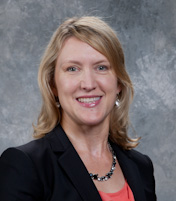 Elizabeth K. Kiser is an associate director in the Division of Research and Statistics division at the Federal Reserve Board of Governors in Washington, DC. She earned a Ph.D. and Master’s degrees in economics from the University of Wisconsin-Madison, and a B.A. in economics and German from the University of North Carolina-Chapel Hill. Dr. Kiser has published economic research on bank competition, consumer choice in banking and payments, and banking supervision, and has conducted policy analysis on a range of topics related to financial sector competition and financial stability.
Elizabeth K. Kiser is an associate director in the Division of Research and Statistics division at the Federal Reserve Board of Governors in Washington, DC. She earned a Ph.D. and Master’s degrees in economics from the University of Wisconsin-Madison, and a B.A. in economics and German from the University of North Carolina-Chapel Hill. Dr. Kiser has published economic research on bank competition, consumer choice in banking and payments, and banking supervision, and has conducted policy analysis on a range of topics related to financial sector competition and financial stability.
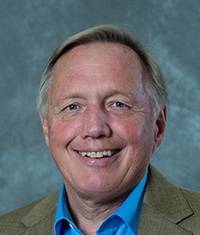 Timothy Koch is a distinguished professor emeritus of the Darla Moore School of Business at the University of South Carolina and president of the Graduate School of Banking at Colorado. He is an experienced researcher, author and presenter on topics of bank-performance analysis, risk management, the pricing of fixed-income securities, equities and financial futures and public finance. He is a co-author of “Bank Management”, a leading college textbook in its seventh edition, and “Community Banking: From Crisis to Prosperity”, a guide for bank directors and senior bank managers to thrive in the coming years.
Timothy Koch is a distinguished professor emeritus of the Darla Moore School of Business at the University of South Carolina and president of the Graduate School of Banking at Colorado. He is an experienced researcher, author and presenter on topics of bank-performance analysis, risk management, the pricing of fixed-income securities, equities and financial futures and public finance. He is a co-author of “Bank Management”, a leading college textbook in its seventh edition, and “Community Banking: From Crisis to Prosperity”, a guide for bank directors and senior bank managers to thrive in the coming years.

Troy Kravitz is a senior financial economist with the Center for Financial Research with the Federal Deposit Insurance Corp. He joined the Center in 2013 after completing his Ph.D. at the University of California, San Diego, where he also received his Master of Arts in Economics. At UCSD, he studied game theory and applied microeconomic theory, particularly industrial organization and political economy. He also taught two courses in intermediate econometrics. Before graduate school, Troy worked for the Urban-Brookings Tax Policy Center and the AEI-Brookings Joint Center for Regulatory Studies. He studied at Emory University and the London School of Economics.
 Yan Lee is a senior financial economist in the Center for Financial Research at the FDIC. She received her doctorate in economics in 2005 from the University of California-Los Angeles, with a specialization in labor and applied micro. Prior to graduate studies, she attended Barnard College at Columbia University, and was employed at the Federal Reserve Bank of New York. Lee’s research interests include crime, homeownership and entrepreneurship.
Yan Lee is a senior financial economist in the Center for Financial Research at the FDIC. She received her doctorate in economics in 2005 from the University of California-Los Angeles, with a specialization in labor and applied micro. Prior to graduate studies, she attended Barnard College at Columbia University, and was employed at the Federal Reserve Bank of New York. Lee’s research interests include crime, homeownership and entrepreneurship.
 Trey Maust is co-founder, co-president, CEO and board member of Lewis & Clark Bank in Oregon City, Ore. Maust began his career in Portland, Ore., where he conducted and managed financial statement audits, internal control assessments and Federal Deposit Insurance Corp. Improvement Act attestation engagements. He later transferred to Deloitte’s Merger and Acquisition Services group in New York City, where he was a national resource for bank acquisitions and for conducting financial and operational due diligence on more than 40 transactions in a variety of industries for both financial sponsors and strategic buyers. Prior to his current position, Maust served as chief financial officer at two Portland-area community banks. He is heavily involved in state and national banking associations, and is also on multiple advisory and fiduciary boards of both for-profit and nonprofit organizations. Maust received a bachelor’s degree in business administration from Portland State University and is a licensed certified public accountant. In 2007, he was recognized as one of the “40 under 40” by the Portland Business Journal.
Trey Maust is co-founder, co-president, CEO and board member of Lewis & Clark Bank in Oregon City, Ore. Maust began his career in Portland, Ore., where he conducted and managed financial statement audits, internal control assessments and Federal Deposit Insurance Corp. Improvement Act attestation engagements. He later transferred to Deloitte’s Merger and Acquisition Services group in New York City, where he was a national resource for bank acquisitions and for conducting financial and operational due diligence on more than 40 transactions in a variety of industries for both financial sponsors and strategic buyers. Prior to his current position, Maust served as chief financial officer at two Portland-area community banks. He is heavily involved in state and national banking associations, and is also on multiple advisory and fiduciary boards of both for-profit and nonprofit organizations. Maust received a bachelor’s degree in business administration from Portland State University and is a licensed certified public accountant. In 2007, he was recognized as one of the “40 under 40” by the Portland Business Journal.
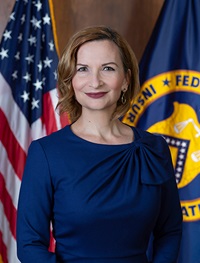 Jelena McWilliams was sworn in as the 21st chairman of the Federal Deposit Insurance Corp. (FDIC) on June 5, 2018. She serves a six-year term on the FDIC Board of Directors, and is designated as chairman for a term of five years. Prior to joining the FDIC, McWilliams was executive vice president, chief legal officer and corporate secretary for Fifth Third Bank in Cincinnati, Ohio. Prior to joining Fifth Third, she worked in the United States Senate for six years, most recently as chief counsel and deputy staff director with the Senate Committee on Banking, Housing and Urban Affairs, and as assistant chief counsel with the Senate Small Business and Entrepreneurship committee. From 2007 to 2010, McWilliams served as an attorney with the Federal Reserve Board of Governors. Before entering public service, she practiced corporate and securities law at Morrison & Foerster LLP in Palo Alto, California, and Hogan & Hartson LLP (now Hogan Lovells LLP) in Washington, D.C. She graduated with highest honors from the University of California at Berkeley with a Bachelor of Science in political science, and earned her Juris Doctor from the UC Berkeley School of Law.
Jelena McWilliams was sworn in as the 21st chairman of the Federal Deposit Insurance Corp. (FDIC) on June 5, 2018. She serves a six-year term on the FDIC Board of Directors, and is designated as chairman for a term of five years. Prior to joining the FDIC, McWilliams was executive vice president, chief legal officer and corporate secretary for Fifth Third Bank in Cincinnati, Ohio. Prior to joining Fifth Third, she worked in the United States Senate for six years, most recently as chief counsel and deputy staff director with the Senate Committee on Banking, Housing and Urban Affairs, and as assistant chief counsel with the Senate Small Business and Entrepreneurship committee. From 2007 to 2010, McWilliams served as an attorney with the Federal Reserve Board of Governors. Before entering public service, she practiced corporate and securities law at Morrison & Foerster LLP in Palo Alto, California, and Hogan & Hartson LLP (now Hogan Lovells LLP) in Washington, D.C. She graduated with highest honors from the University of California at Berkeley with a Bachelor of Science in political science, and earned her Juris Doctor from the UC Berkeley School of Law.
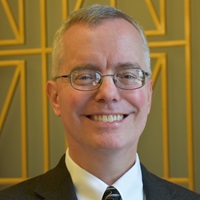 Andrew P. Meyer is a senior economist in the Community Bank Research and Outreach office of the Federal Reserve Bank of St. Louis. He received a doctorate in economics from Washington University in St. Louis and has worked at the Federal Reserve since 1994. In addition to his research on community banking issues, Meyer conducts statistical analysis of the downgrade and failure risk of commercial banks. He also serves on a committee to improve the Federal Reserve's off-site bank surveillance program and has taught regularly in examiner training schools.
Andrew P. Meyer is a senior economist in the Community Bank Research and Outreach office of the Federal Reserve Bank of St. Louis. He received a doctorate in economics from Washington University in St. Louis and has worked at the Federal Reserve since 1994. In addition to his research on community banking issues, Meyer conducts statistical analysis of the downgrade and failure risk of commercial banks. He also serves on a committee to improve the Federal Reserve's off-site bank surveillance program and has taught regularly in examiner training schools.

Mike Milchanowski is a supervisory officer in the Supervision division of the Federal Reserve Bank of St. Louis. He is currently responsible for the division’s Statistics and Reserves Administration units, and has oversight of the division’s quality assurance program. In his prior role with the St. Louis Fed, Milchanowski led the Supervisory Policy and Risk Analysis team and was a member of the Community Banking in the 21st Century research and policy conference planning group. Prior to joining the St. Louis Fed, Milchanowski served as an assistant vice president at M&T Bank, where he was responsible for commercial credit risk modeling, including the development of the institution’s probability of default and loss-given default models, as well as CCAR and CapPR Federal Reserve stress testing programs.
He holds an MBA from the University of Maryland and a Bachelor of Science in financial economics from the University of Maryland, Baltimore County.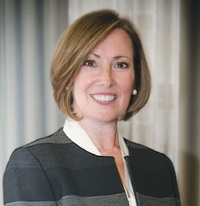 Gilda M. Nogueira has served East Cambridge Savings Bank for 40 years. She began as a part-time teller and now serves as President and Chief Executive Officer of the Bank and its holding company, 1854 Bancorp. East Cambridge Savings Bank, established in 1854, is a $1.0 billion Massachusetts state-chartered savings bank. Headquartered in Cambridge, Massachusetts, the Bank operates 10 full-service banking centers, as well as an education training facility at Cambridge Rindge and Latin (High) School. In addition, Gilda also serves as President of East Cambridge Savings Charitable Foundation.
Gilda M. Nogueira has served East Cambridge Savings Bank for 40 years. She began as a part-time teller and now serves as President and Chief Executive Officer of the Bank and its holding company, 1854 Bancorp. East Cambridge Savings Bank, established in 1854, is a $1.0 billion Massachusetts state-chartered savings bank. Headquartered in Cambridge, Massachusetts, the Bank operates 10 full-service banking centers, as well as an education training facility at Cambridge Rindge and Latin (High) School. In addition, Gilda also serves as President of East Cambridge Savings Charitable Foundation. Gilda is a strong industry advocate and demonstrates her passion and belief in the responsibility of buisiness leaders giving back to the communities they are a part of through personal example. Gilda is past chair of the Massachusetts Bankers Association (2016-2017), member of the American Bankers Association Banker Advocacy and Grassroots Committee; Chair of the Federal Reserve Bank of Boston’s Community Depository Institutions Advisory Council (CDIAC), and President of the Federal Reserve’s Community Depository Institutions Advisory Council at a national level representing the First District; and member of the Board of the Depositors Insurance Fund. Gilda supports numerous causes and organizations focused on improving the quality of life in the communities served by the bank. She is past president of the Somerville Rotary Club and continues her membership on the Rotary Club of Somerville as Board Member and Secretary, serves the Cambridge YMCA as member of the Board of Trustees and Treasurer, Advisory Board Member of Little Sisters of the Poor, and is passionate for helping those less fortunate, be it as a volunteer cook or by helping the homeless by preparing care packages for distribution by local organizations.
Gilda is a graduate of Lesley University, and a graduate of the National School of Banking – America’s Community Bankers at Fairfield University, and the New England School of Banking – Massachusetts Bankers Association at Babson.
Gilda has received various awards including Bankers and Tradesman “Women of Fire” (2013); Paul Harris Fellow by Rotary International (2014); Girl Scouts “Lady Baden-Powell Award” (2015); Good Neighbor/Community Hero Award by the New England Financial Marketing Association (NEFMA) (2016); and named in Top 100 Women-Led Businesses in Massachusetts by The Commonwealth Institute and the Boston Globe Magazine (2017).
Though modest about her professional accomplishments, she is quick to voice both pride and appreciation of her family. She is a mother of four adult children and a grandmother of seven. Gilda resides in Medford, Massachusetts with her husband of 38 years.
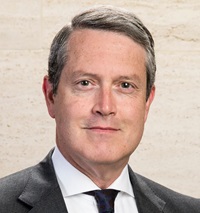 Randal K. Quarles took office as a member of the Board of Governors of the Federal Reserve System on October 13, 2017, to fill an unexpired term ending on January 31, 2018. He was sworn in as Vice Chairman for Supervision on October 13, 2017. His term as Vice Chairman for Supervision ends on October 13, 2021.
Randal K. Quarles took office as a member of the Board of Governors of the Federal Reserve System on October 13, 2017, to fill an unexpired term ending on January 31, 2018. He was sworn in as Vice Chairman for Supervision on October 13, 2017. His term as Vice Chairman for Supervision ends on October 13, 2021.Prior to his appointment to the Board, Mr. Quarles was founder and managing director of the Cynosure Group, a Utah-based investment firm. Before founding the Cynosure Group, Mr. Quarles was a partner at The Carlyle Group, a private equity firm based in Washington, DC.
From September 2005 to November 2006, Mr. Quarles served as Under Secretary of the Treasury for Domestic Finance. Prior to serving as Under Secretary, from April 2002 to August 2005, Mr. Quarles was Assistant Secretary of the Treasury for International Affairs. During his tenure, Mr. Quarles served as policy chair of the Committee on Foreign Investment in the United States. Prior to joining the Department of the Treasury, Mr. Quarles served, from August 2001 to April 2002, as the U.S. Executive Director of the International Monetary Fund.
From January 1991 to January 1993, he served in the Treasury Department as a Special Assistant to the Secretary of the Treasury for Banking Legislation and as Deputy Assistant Secretary of the Treasury for Financial Institutions.
Prior to, and in between, his service at the Department of the Treasury, Mr. Quarles was a partner at Davis Polk & Wardwell, serving in their New York and London offices.
Mr. Quarles was born in September 1957. He received an A.B. in philosophy and economics, summa cum laude, from Columbia in 1981 and earned a law degree from the Yale Law School in 1984.
Mr. Quarles is married with three children.
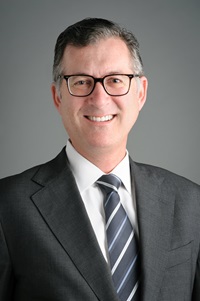
John W. Ryan is the president and CEO of the Conference of State Bank Supervisors, the national association representing state banking supervisors and the leading advocate for advancing the state banking system. Before being named CSBS president and CEO in August 2011, Ryan was CSBS's executive vice president, a position he had held since October 2003. He first joined CSBS in 1997 as an assistant vice president for legislative affairs. Prior to joining CSBS, Ryan worked at Newmyer Associates, a public affairs consulting firm, where he led the company's financial services consulting practice. Previous to his work at Newmyer Associates, Ryan spent four years as a professional staff member to the U.S. House of Representatives Committee on Banking, Finance and Urban Affairs. Ryan received a bachelor's degree in political science and economics from the University of California-Berkeley.
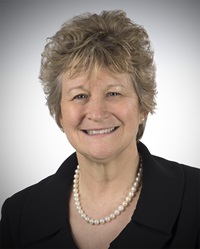
Julie Stackhouse is executive vice president and managing officer of supervision, credit, community development and learning innovation for the Federal Reserve Bank of St. Louis. Prior to joining the St. Louis Fed in September 2002, Stackhouse served as vice president and managing officer of the Risk Management department of the Federal Reserve Bank of Minneapolis. In addition, she was formerly an officer with the Federal Reserve Bank of Kansas City prior to relocating to Minnesota in 1995. She served in many capacities at the Kansas City Reserve Bank, starting as an examiner in 1980. Stackhouse holds a bachelor's degree in business administration from Drake University and is a graduate of the Wisconsin Graduate School of Banking. She currently serves as president-elect of the Board for National Charity League, Inc., a mother-daughter philanthropic organization, and as a member of the St. Louis Forum. In 2010, Stackhouse was named a St. Louis Business Journal “Most Influential Business Women” recipient, and in 2016, was recognized with the Delta Sigma Pi Lifetime Achievement Award.

Michael Stevens is the senior executive vice president at the Conference of State Bank Supervisors (CSBS). He is responsible for leading the organization's public policy, financial supervision, federal coordination, communications, industry relations and professional development functions. Stevens also serves as the principal deputy to the state banking member of the Financial Stability Oversight Council. Prior to his appointment in September 2011, he served as the senior vice president for regulatory policy, representing the state banking system in the development of policy in the areas of financial stability, prudential supervision and consumer protection. He joined CSBS in 1999 to work in all facets of CSBS's professional development division. Stevens is a frequent instructor and speaker on banking policy, examinations and financial analysis. He serves on the faculty of the Graduate School of Banking at Colorado and at Texas Tech University's School of Banking. He began his regulatory career as a bank examiner for the Iowa Division of Banking, where he served 11 years.
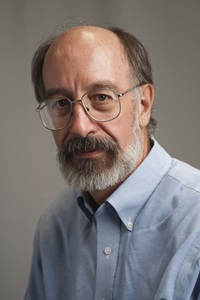
Gregory F. Udell is the Chase Chair of Banking and Finance at the Kelley School of Business at Indiana University. He is, or has been, a visiting economist, scholar and/or consultant to the Board of Governors of the Federal Reserve System, the Bank of Japan, the Bank of Italy, the European Central Bank, the Federal Reserve Banks of Chicago and San Francisco, the International Finance Corp., the Organisation for Economic Co-operation and Development, the People's Bank of China, the Riksbank and the World Bank. Before joining the Kelley School of Business in 1998, he was a professor of finance and director of the William R. Berkley Center for Entrepreneurial Studies at the Stern School of Business at New York University. Prior to his academic career, Udell was a commercial loan officer in Chicago. His work focuses mostly on financial contracting, credit availability and financial intermediation and it has been published in nearly 100 publications, including leading accounting, economics and finance journals. He is the author of a textbook on asset based lending, Asset-Based Finance (2004), a co-author (with L. Ritter and W. Silber) of Principles of Money, Banking and Financial Markets, 12th edition (2009), and is, or has been, an associate editor/editorial board member of seven academic journals including the Journal of Money, Credit and Banking, the Journal of Banking and Finance, the Journal of Financial Services Research and Small Business Economics.
Video Gallery


